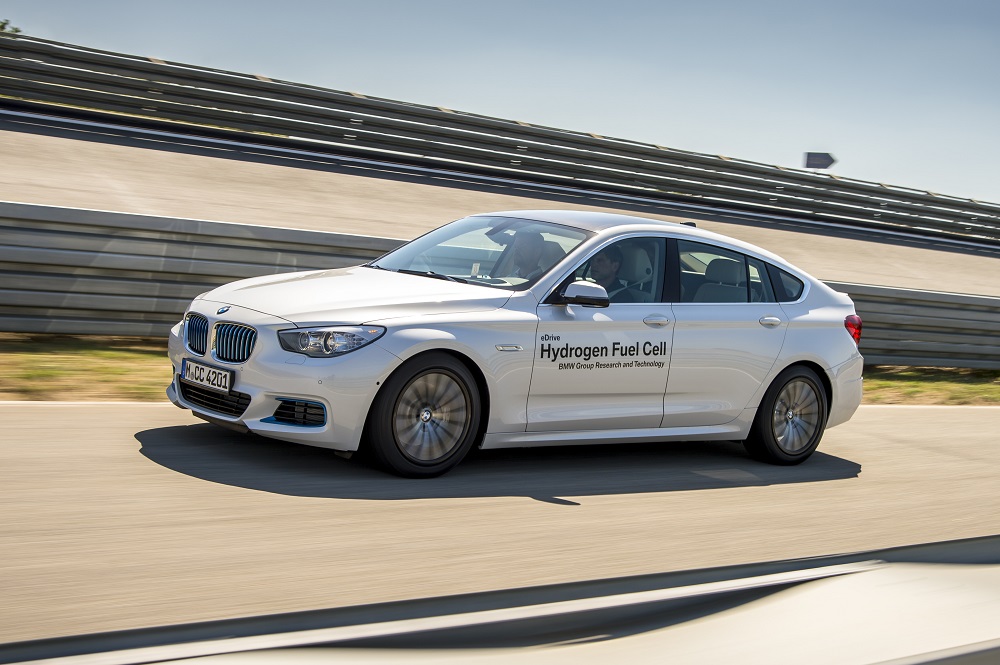There’s no right answer at this stage to the automotive world’s problem of not being green enough – other than perhaps giving all new cars a nice lick of leafy paint. So while a lot of noise is made about electric vehicles and their hybrid cousins (see Tesla, BMW i-cars etc) there’s an ongoing push toward alternate fuel sources like hydrogen. BMW, in partnership with Toyota, is ready to begin testing its hydrogen fuel cell vehicle this month, for a planned roll out sometime beyond 2020. There’s a lot to do before then too, like building re-fueling infrastructure. Not a cheap exercise. In fact it’s this kind of hold up and expense that has stopped BMW putting hydrogen power on the market. We’ll be watching these developments closely. – Miles Downard
By Elisabeth Behrman
 (Bloomberg) – BMW AG will test a vehicle powered by hydrogen fuel cells on public roads this month as the German automaker looks to expand clean-car offerings after rolling out the battery-powered i3 in 2013.
(Bloomberg) – BMW AG will test a vehicle powered by hydrogen fuel cells on public roads this month as the German automaker looks to expand clean-car offerings after rolling out the battery-powered i3 in 2013.
The company plans “a technically mature, customer-ready vehicle some time after 2020,” Matthias Klietz, head of powertrain research, told journalists at BMW’s test track in Miramas, France. “By around 2025 to 2030, we expect fuel cell cars to have an established presence, but there are challenges that remain, like building the refueling infrastructure.”
BMW is developing fuel cells with Japanese partner Toyota Motor Corp., and it demonstrated a 5-Series Gran Turismo prototype in Miramas on Wednesday that uses the companies’ joint technology. The model is part of the car industry’s multibillion-dollar effort to create alternative powering setups and improve fuel use to meet tightening emissions rules.
Fuel cells, which have provided spacecraft with power since the 1960s, produce electricity by reacting hydrogen with air, enabling longer travel than battery-driven vehicles while emitting only water vapor rather than carbon dioxide. Disadvantages include a lack of service stations equipped to replenish the hydrogen gas, and the high cost of rare metals needed for the technology.
On a trip around the Miramas track, the Gran Turismo handled like any other electric car, except for a hissing sound during sharp acceleration from a pump passing hydrogen and air through the fuel cells. BMW also showed a plug-in hybrid version of its van-like 2-Series Active Tourer, due to go on sale next year, and a 1-Series compact equipped with a conventional motor that uses water injection to boost fuel efficiency.
Demand Challenge
By the start of 2018, the world’s fleet of fuel-cell cars will number just 8,400, up from a total 1,275 at the end of this year, Bloomberg New Energy Finance estimates. Toyota and Japanese competitors Nissan Motor Co. and Honda Motor Co. pledged Wednesday to contribute funds to developing a hydrogen- fueling network in the country.
The fuel-cell Gran Turismo has a range of 500 kilometers (310 miles) before refueling. That’s more than triple the i3’s 160 kilometers. The i3’s batteries take at least five hours to recharge, compared with five minutes to fill the prototype’s hydrogen tank.
“Technically, we’re ready to put fuel-cell cars on the road, but so far it remains too expensive,” said Axel Ruecker, who’s part of the hydrogen development team at Munich-based BMW. “Making fuel-cell technology a reality is a task not just for carmakers, but for the whole of society.”
Toyota’s Mirai
Toyota, the world’s biggest auto manufacturer, began sales in December of the Mirai fuel-cell sedan, its first production vehicle to run on hydrogen. The four-door model costs $62,000 in the U.S., where the company is targeting 3,000 deliveries of the car through 2017. Hyundai Motor Co. started retail leasing in California in 2014 of a hydrogen-powered Tucson crossover, including unlimited refueling for three years.
BMW, the world’s largest maker of luxury cars, began cooperating with Toyota in 2013, with about 100 people involved in the fuel-cell project across the two companies. The partners said Monday that they plan to make fuel-cell components by 2020. The alliance also includes sharing development of a mid-size sports car.

